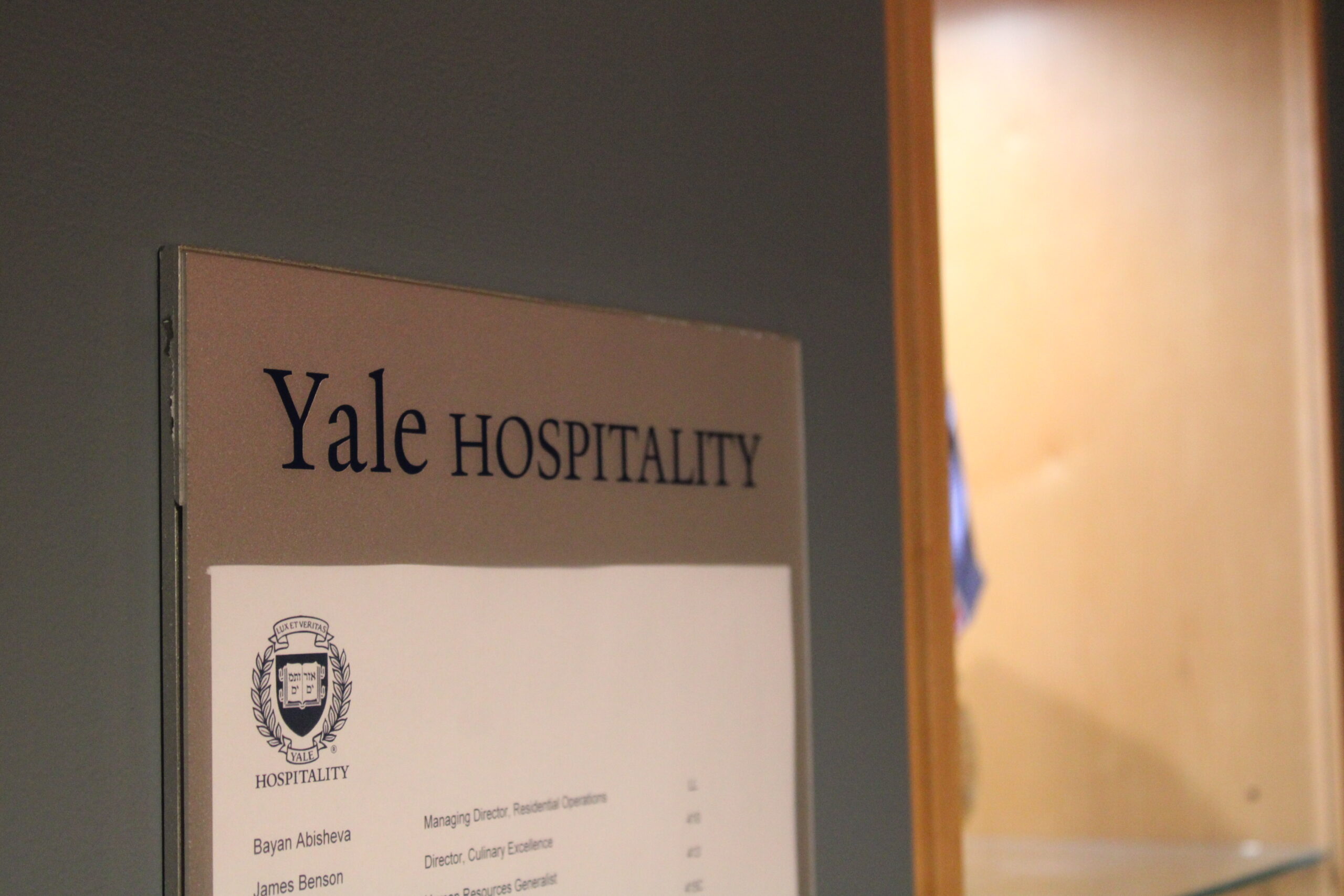Yalies express mixed reactions to new menu changes
The majority of students interviewed by the News feel positive or neutral about the implemented changes, which ignited controversy when first announced. Concerns remain over nutritious breakfast options.

Samad Hakani, Photography Editor
After returning from spring break, Yalies were met with Yale Hospitality’s newest menu changes.
In February, Yale Hospitality announced that select dining halls — Pierson, Davenport, Trumbull, Jonathan Edwards and Timothy Dwight — would adopt new lunch and breakfast menus.
Hot sandwiches, fries, falafel wraps and an expanded salad bar are now the set menu in these residential colleges rather than the rotating hot lunch menu. For breakfast, these dining halls, along with Berkeley, now offer pastries, cereal and hard-boiled eggs, but have removed oatmeal, yogurt and cut fruit. New specialty coffee machines, which offer lattes, cappuccinos, espresso and hot chocolate, were also added.
The News asked 30 students about their reactions to these changes: 11 expressed positive feelings, 12 neutral and seven negative. But with the new menus only in place for a few days, several students speculated that the dining halls have not yet experienced the full effects of the changes.
“I think that [the new lunch concept] offers a consistent lunch alternative, but it doesn’t address dining hall crowding and staff being overworked,” said Vy Nguyen ’27, a student in Pierson College, one of the colleges to implement the menu change. “Students will still want to head to more ‘popular’ halls, like Silliman, once the novelty of the new concept wears out.”
Lizzie Seward ’27, a student in Davenport College, said that she actually “prefers sandwiches to a lot of the regular lunch options.”
Anika Shethia ’27 said that as a lifelong vegetarian, she is “pretty happy” about the additions to the salad bar.
“I’ve been vegetarian my whole life, so I end up having a lot of salads! I am pretty happy about the new additions to the salad bar, new dressings and all,” Shethia said. “Of course, the coffee machines are great too.”
Ting Key ’27 told the News that he values breakfast as the most important meal of his day and a quiet, productive start. While he was concerned by the removal of oatmeal and yogurt, he spoke positively about the new coffee machines and expanded lunch options. He explained that he could still “walk 400 feet” to a dining hall with different options, but appreciated the convenience of dining in his own residential college during busy mornings.
Kyan Ramsay ’27, who is part of the Yale College Council Dining Team, told the News that he felt the reductions in dining options were hard to accept, given the rising cost of the food plans.
“Every student should be able to enjoy a full and nutritious breakfast, lunch, and dinner in their own college – that’s what Yale sold us as an essential part of our college experience,” Ramsay wrote.
According to Yale’s website about tuition breakdown, food costs for the 2025-26 school year increased by $500, from $8,600 to $9,100. This comes as total cost rose to $90,550, 3.9 percent higher than the current term bill.
When the policy change first became public, it was unpopular with many students.
After the YCC found out about the upcoming changes, Dining Policy Director Anna Krans ’27 authored an open letter calling for a boycott of hosting prefrosh for Bulldog Days, Yale’s admitted student visiting days, until the University agreed to reinstate the previous lunch policies in all residential dining halls.
The letter argued that removing standard lunch from the five select dining halls “imposes a hierarchy upon the residential college system” and “is the latest in a series of cost-cutting changes” made by Hospitality amid increasing meal plan costs. Over 200 students, including several YCC senators, undersigned Krans’ arguments.
Krans did not immediately respond to comment on whether the Bulldog Days boycott would go ahead.
YCC President Mimi Papathanasopolous ’26 and Vice President Esha Garg ’26 asserted that the YCC has found that students are upset with the express breakfast model. Per Garg, an ongoing YCC survey revealed that many students find the new express breakfast model, which forgoes fruit and oatmeal for pastries, “not nutritious or healthy.”
“Personally, as a student in Grace Hopper, the Breakfast Express is disappointing; it has led me to skip breakfast altogether,” Garg wrote. “I believe that if Yale Hospitality is going to increase the price of its meal plans every year but also charge the same price for a meal plan for all students (regardless of residential college), a nutritious breakfast must be available in each college.”
Controversy over menu changes is a long-standing Yale tradition. In 1953, a group of disgruntled Yale students complained to the student association about the change from apricot juice to lemonade in a vending machine.







